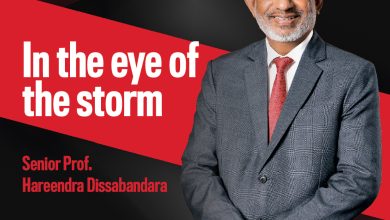NATIONAL SAVINGS BANK
National Savings Bank (NSB) was established via Parliament Act No. 30 of 1971 by the then Minister of Finance Dr. N. M. Perera, amalgamating four unique institutes engaged in providing financial services to the people at the time – Ceylon Savings Bank, Ceylon Post Office Savings Bank, Savings Certificates Section of Postmaster General’s Department and Ceylon War Savings Movement. On 16 March 1972, NSB was declared open for regular business operations; and in 2022, the bank commemorates its Golden Jubilee. NSB is the only bank with a 100 percent government guarantee for its depositors’ money and interest.
Q: What are the main attributes of your bank’s image?
A: NSB has established its position as a bank that relentlessly strives to foster a savings culture among all Sri Lankans.
We have a vision to be the most reliable and sought after choice for savings and investment solutions. And we provide our customers with total financial solutions to optimise their savings and investment needs whilst meeting the expectations of all stakeholders.

General Manager/Chief Executive Officer
Our reach has been extended to 261 branches with 292 ATMs and 92 CRMs, as well as 4,064 post offices and sub-post offices – enabling customers living across the island to obtain the bank’s services comprehensively with trust, mutual respect and integrity.
Digitalisation is a key area we have focused on in the past year. Customers now have access to online and mobile banking services through NSB Reach, thanks to the bank’s expanded service distribution. We have also introduced the NSBPay App, a mobile payment system that enables customers to meet their daily banking needs safely and efficiently while enjoying uninterrupted service at all times.
In retrospect, NSB feels privileged for its five decades of financial inclusion and economic empowerment of the country.
Q: Does social responsibility continue to be a part of ‘corporate respect’?
A: CSR accounts for much of stakeholders’ perceptions as it demonstrates the bank’s accountability and commitment to advancing social and environmental issues. At NSB however, social responsibility takes place from a position of genuine care for the wellbeing of the communities and society in which we operate.
NSB has a strong reputation as a bank dedicated to conducting business in a way that benefits society as a whole, by supporting long-term development projects and socioeconomic initiatives of the government. In addition, the bank has come forward to extend a helping hand to the community as and when required.
Our most recent corporate social responsibility initiative is focussed on the United Nations’ Sustainable Development Goal (SDG) 4: to ensure inclusive and equitable quality education, and promote lifelong learning opportunities for all.
We have selected national schools with a GCE O-Level pass rate below 50 percent; and enrol Grade 7, 8 and 9 students on a three year English language training programme. With this project, we aim to ensure a ‘future ready’ education that would lead to productive adulthood.
Q: What are the ways in which ‘corporate reputation’ gives businesses a competitive edge?
A: It’s critical to understand how an organisation is seen by its internal and external stakeholders, and in which ways the likelihood of its future behaviour can be predicted based on its previous acts.
As a banking leader, NSB’s legacy of over 50 years as an excellent and continuous service provider to this nation serves as a testimony, which secures a distinct edge over our competitors.
It is the only bank in Sri Lanka to be successively rated ‘AAA’ since 2003. In 2022, the bank was recognised and awarded as the fifth most valuable brand in Sri Lanka by Brand Finance Lanka with a brand value of US$ 166 million.
And it was also recognised as one of the 10 ‘Most Admired Companies in Sri Lanka’ by the International Chamber of Commerce Sri Lanka (ICCSL) in collaboration with the Chartered Institute of Management Accountants (CIMA).
Speaking volumes for the gender equal culture we practise at NSB, the bank was recognised as one of the top 10 ‘women friendly’ workplaces at the first ever Women Friendly Workplace Awards (WFWP Awards) 2021.
NSB feels it is a natural human tendency to spend more as we earn more. This approach puts us in a perpetual ‘holding pattern’ – running ever faster to keep us from backsliding financially. On the other hand, saving is a habit that provides financial security and freedom. It also secures you in a financial emergency.
QUICK-FIRE ROUND
Three recommendations to revive Sri Lanka’s economy
Attracting global investors to commence new projects to improve foreign export income, as well as other macroeconomic factors such as employment rates and current accounts.
Rebuilding the tourism industry by way of comprehensive promotional campaigns including attractive packages for tourists and international travellers.
Enhancing and securing foreign remittances, through overseas employment of skilled employees and outsourcing of professionals – while boosting the agriculture export sector.
Three most admired global business leaders
Bill Gates – Cofounder of Microsoft
Jeff Bezos – Founder of Amazon
Jack Ma – Cofounder of Alibaba Group
Telephone 2379379 | Email callcentre@nsb.lk | Website www.nsb.lk







